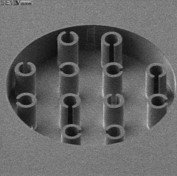EVONETIX LTD (‘Evonetix’), the synthetic biology company developing a desktop platform for scalable, high-fidelity and rapid gene synthesis, today announced it has partnered with imec, a world-leading research and innovation hub active in the fields of nanoelectronics and digital technologies, to increase production of Evonetix’s proprietary microelectromechanical systems (MEMS)-based silicon chips, enabling the platform to be manufactured at a commercial scale. The novel silicon chip is a key component of Evonetix’s desktop DNA platform which, once fully developed, will facilitate and enable the rapidly growing field of synthetic biology.

[ad_336]
Evonetix’s technology utilises a silicon chip, made by MEMS processing, that controls the synthesis of DNA at many thousands of independently controlled reaction sites or ‘pixels’ on the chip surface in a highly parallel fashion. Following synthesis, strands are assembled on-chip into double-stranded DNA in a process that identifies and removes errors, enabling accuracy, scale and speed that is several orders of magnitude better than conventional approaches. Under the terms of the collaboration, imec will work with Evonetix to scale up manufacturing of the MEMS technology on 8-inch silicon wafers, enabling Evonetix to supply customers in volume. Imec is able to leverage its experience in manufacturing silicon for life sciences applications to transfer the novel Evonetix process to their foundries and to manage further expansion in volume.
Dr Matthew Hayes, Chief Technology Officer at Evonetix, said: “With the support of imec, a world-renowned leader in microchip technology, we will be able to optimise our highly parallel desktop platform for commercial supply.”
Peter Peumans, Senior vice president life science technologies at imec added: “We have extensive practical knowledge of chip design and technology, which we use to help develop innovative tools for the life sciences and pharma R&D. Evonetix has developed an innovative approach that integrates physics and biology to enable the production of high-fidelity long DNA in a highly parallel fashion. We are eager to contribute to their success using our nanotechnology capabilities.”